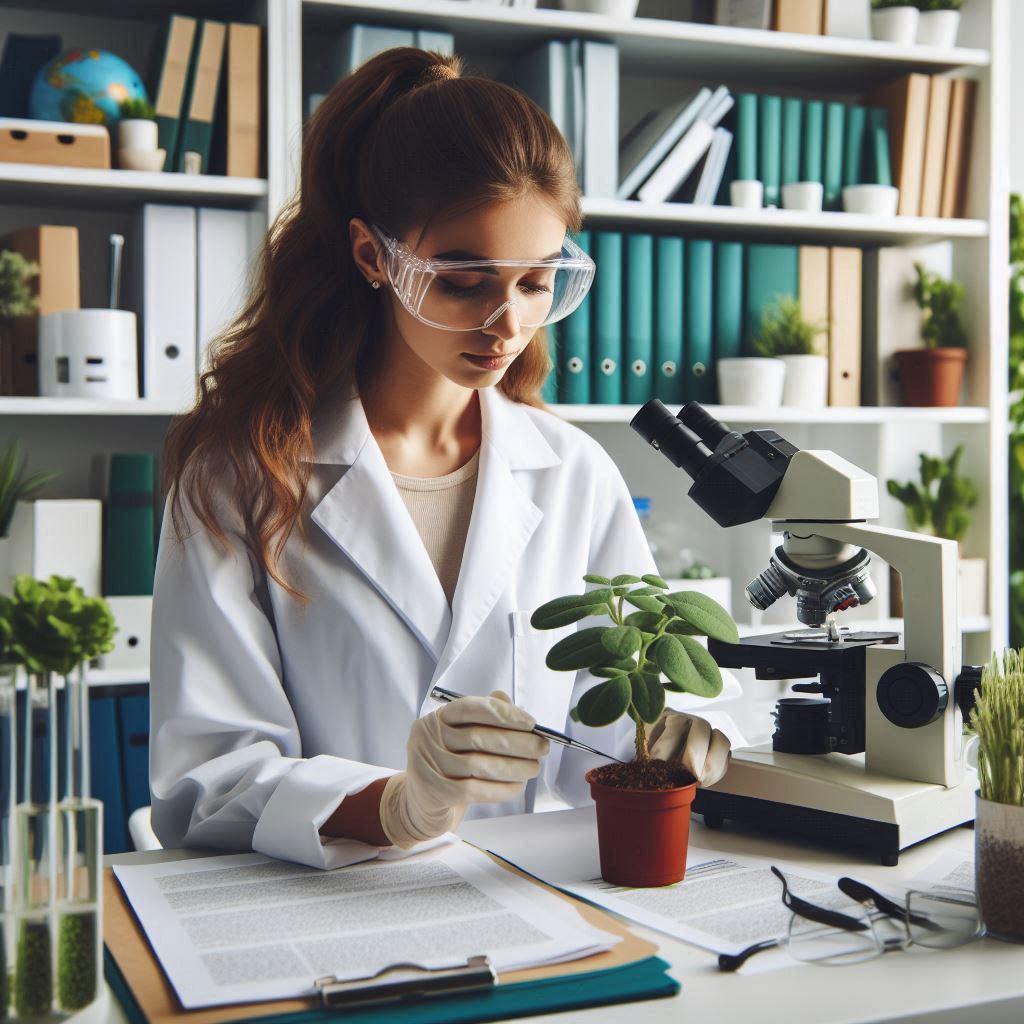Introduction
Plant science is essential in addressing global food security, which ensures access to sufficient, safe, and nutritious food for all.
Food security depends on stable food production, availability, and affordability.
However, climate change, population growth, and pests threaten global food supplies.
Plant science helps mitigate these threats by improving crop yields, enhancing nutritional content, and developing resilient crops.
It focuses on breeding plants that can withstand environmental stress and diseases.
By using plant genetics and biotechnology, scientists create more efficient and productive crop varieties.
The role of plant science extends beyond production.
It also ensures sustainable agricultural practices, promoting soil health and biodiversity.
These efforts maintain ecosystem balance while increasing the food supply.
As the global population continues to grow, plant science remains critical to meeting food demand.
Ultimately, plant science provides innovative solutions to improve food security worldwide.
It addresses the challenges faced by modern agriculture and paves the way for sustainable farming practices.
Without advancements in plant science, achieving global food security would be difficult.
Therefore, investing in this field is vital for future food systems and ensuring a stable food supply for all.
Understanding the role of plant science in food production
How Plant Science Contributes to Improving Crop Yield
Plant science plays a critical role in enhancing food production.
It combines knowledge from genetics, biology, and agriculture to improve crop yield and quality.
Scientists apply plant science principles to develop innovative techniques for growing food sustainably.
One key area of focus is improving crop yield.
Researchers study plant traits and environmental factors affecting growth.
By understanding these variables, they can optimize farming practices.
Increased crop yield is essential for feeding a growing global population.
The United Nations projects that the world population will reach nearly 10 billion by 2050.
Meeting this demand requires significant advancements in food production.
Importance of Plant Breeding and Genetic Engineering in Developing Resilient Crops
Plant breeding is a fundamental aspect of plant science.
It involves selecting parent plants with desirable traits to produce offspring.
Traditional breeding techniques have successfully developed high-yield and disease-resistant varieties.
However, the process can be time-consuming and limited by natural genetic variation.
Genetic engineering offers a powerful alternative to traditional breeding.
Scientists can manipulate plant genes directly to create crops with specific traits.
This technology allows for rapid development of resilient crops capable of withstanding pests, diseases, and environmental stresses.
For instance, scientists have developed genetically modified (GM) crops that resist drought and require fewer resources.
Moreover, plant science contributes to sustainable agriculture.
It helps reduce the environmental impact of farming.
By developing crops that require less water, fertilizers, and pesticides, scientists promote more sustainable practices.
This approach conserves natural resources while maintaining productivity.
The importance of plant science in addressing food security cannot be overstated.
As climate change threatens agricultural systems, resilient crops become increasingly vital.
Plant scientists continuously seek ways to improve crop adaptability to changing environmental conditions.
These innovations enhance food security for future generations.
Furthermore, collaboration between scientists, farmers, and policymakers is crucial.
This partnership ensures that scientific advancements reach the field.
By working together, they can implement effective strategies for sustainable food production.
Understanding the role of plant science in food production is essential for ensuring food security.
Improving crop yield through plant breeding and genetic engineering plays a significant role.
As global challenges intensify, plant science will remain pivotal in developing resilient crops.
Investing in this field is crucial for feeding the world’s growing population sustainably.
Read: Profiles in Success: Leading Chemists of the 21st Century in the US
Impact of climate change on food security
How Plant Science Can Help in Developing Climate-Resilient Crops
Climate change significantly affects food security worldwide.
Rising temperatures, shifting rainfall patterns, and extreme weather events threaten crop yields.
In response, plant science plays a crucial role in developing climate-resilient crops.
Researchers study how plants adapt to environmental stressors, such as drought, flooding, and heat.
They identify genes linked to these traits, enabling targeted breeding programs.
Plant breeders use traditional and advanced techniques to enhance resilience.
Traditional breeding methods focus on selecting plants that thrive in local conditions.
Meanwhile, genetic engineering allows for the introduction of specific traits more rapidly.
For example, scientists have created drought-tolerant maize varieties through genetic modification.
These crops maintain yields even in low-water conditions.
In addition, biotechnology can improve crop resilience to diseases.
Climate change can increase the prevalence of pests and pathogens.
Scientists work to develop crops with enhanced disease resistance, reducing the need for chemical treatments.
This approach helps maintain yields while minimizing environmental impact.
Importance of Sustainable Agricultural Practices in Combating the Effects of Climate Change
Sustainable agricultural practices are essential in combating climate change effects.
These practices promote soil health, conserve water, and enhance biodiversity.
Crop rotation, cover cropping, and agroforestry are examples of sustainable methods.
They improve soil structure and fertility, helping crops withstand climate stresses.
Implementing sustainable practices also reduces greenhouse gas emissions.
For example, reducing tillage helps store carbon in the soil.
This not only mitigates climate change but also enhances soil health, supporting better crop yields.
Farmers play a vital role in adopting sustainable practices.
Education and training programs can help them implement these methods effectively.
By understanding the benefits, farmers are more likely to adopt practices that promote resilience.
Collaboration among scientists, policymakers, and farmers is crucial.
This partnership ensures that research findings translate into practical solutions for food production.
Policymakers can support sustainable practices through incentives and funding.
Meanwhile, scientists can provide data to guide decision-making.
Furthermore, ongoing research is necessary to address future challenges.
Climate change is dynamic, and agricultural systems must adapt continuously.
Plant science must remain at the forefront of developing innovative solutions.
The impact of climate change on food security is profound.
Plant science plays a crucial role in developing climate-resilient crops.
By combining research with sustainable agricultural practices, we can combat climate change effects.
Investing in these strategies is essential for ensuring global food security in the face of climate change.
Read: The Life and Times of a U.S. Physicist: A Day in Detail
Importance of plant health in ensuring food security
Role of Plant Science in Disease and Pest Management
Plant health is essential for ensuring global food security.
Healthy plants produce higher yields and improve food quality.
Plant science plays a crucial role in managing diseases and pests that threaten crops.
Researchers study plant pathogens, pests, and environmental factors affecting plant health.
They identify the conditions that lead to outbreaks and the best practices for prevention.
Integrated Pest Management (IPM) is a key strategy in disease and pest control.
IPM combines biological, cultural, and chemical methods to manage pests sustainably.
Plant scientists develop pest-resistant varieties, reducing the need for chemical treatments.
These resistant plants minimize crop losses while promoting a healthier ecosystem.
Moreover, plant health monitoring technologies have advanced significantly.
Remote sensing and data analysis help farmers detect issues early.
By identifying symptoms of disease or pest infestations promptly, farmers can take action before significant damage occurs.
This proactive approach protects crop health and maximizes yields.
Benefits of Utilizing Biotechnology and Integrated Pest Management Techniques
Biotechnology offers innovative solutions to enhance plant health.
Genetic engineering allows scientists to create crops with built-in resistance to specific pests and diseases.
For example, Bt cotton contains a gene from a bacterium that kills certain insects.
This reduces reliance on chemical pesticides, leading to safer food production.
In addition, biotechnology can improve plants’ nutritional content.
Scientists can enhance essential vitamins and minerals in crops through genetic modification.
This not only supports food security but also addresses malnutrition in vulnerable populations.
Integrated Pest Management techniques complement biotechnology.
IPM focuses on preventing pest problems rather than solely reacting to them.
Farmers use crop rotation, companion planting, and habitat manipulation to deter pests.
These methods maintain biodiversity and create a balanced ecosystem, reducing the likelihood of pest outbreaks.
Education and training in plant health management are vital.
Farmers must understand the latest techniques and technologies to protect their crops effectively.
Extension services can provide resources and support for adopting IPM practices.
This knowledge empowers farmers to make informed decisions about managing pests and diseases.
Furthermore, collaboration among scientists, farmers, and policymakers is essential.
Researchers need feedback from farmers to develop practical solutions.
Policymakers can support initiatives that promote sustainable pest management practices.
Together, they can ensure that advancements in plant science translate into improved food security.
Plant health is vital for global food security.
Effective disease and pest management strategies, including biotechnology and IPM, are essential.
By prioritizing plant health, we can enhance crop yields and ensure a stable food supply.
Investing in these approaches is crucial for sustainable agriculture and a food-secure future.
Read: Salary Ranges: What to Expect as a Physicist in the USA

Enhancing nutritional value through plant science
Exploration of Biofortification and Its Impact on Improving Food Quality
Biofortification is a vital strategy in enhancing the nutritional value of food crops.
It involves breeding plants to increase their nutrient content.
This method aims to combat malnutrition, especially in developing countries.
Researchers focus on key nutrients, such as vitamins and minerals, to improve health outcomes.
For example, biofortified crops like Golden Rice contain increased levels of provitamin A.
This modification helps address vitamin A deficiency, which can lead to severe health issues.
Similarly, iron and zinc biofortification in staple crops improves the nutritional quality of diets.
By enhancing these essential nutrients, biofortified crops contribute to better overall health.
The impact of biofortification extends beyond individual health.
Healthier populations lead to increased productivity and economic growth.
When people receive adequate nutrition, they perform better in school and work.
This positive cycle strengthens communities and fosters sustainable development.
Role of Plant Science in Developing Crops with Enhanced Nutritional Content
Plant science plays a crucial role in developing crops with enhanced nutritional content.
Researchers employ traditional breeding methods and modern biotechnology to achieve this goal.
They identify and select plants with naturally high nutrient levels for breeding programs.
Molecular techniques, such as genetic mapping and gene editing, accelerate the process.
Scientists can pinpoint specific genes responsible for nutrient accumulation.
By manipulating these genes, they can create varieties with improved nutritional profiles.
Moreover, understanding the interactions between plants and their environment is essential.
Soil health, nutrient availability, and growing conditions influence a plant‘s nutritional content.
Plant scientists study these factors to optimize crop management practices.
By enhancing soil health and using sustainable farming techniques, farmers can further improve crop nutrition.
Public awareness and education about biofortified crops are also critical.
Farmers and consumers need to understand the benefits of these crops.
Extension programs can provide information about growing and consuming biofortified varieties.
This knowledge empowers communities to make informed decisions about their diets.
Furthermore, collaboration among scientists, government agencies, and non-governmental organizations is vital.
Joint efforts can promote research, development, and distribution of biofortified crops.
Support from policymakers can facilitate the adoption of these crops in agricultural systems.
Increased investment in plant science research can drive innovations that enhance food quality.
Enhancing nutritional value through plant science is essential for global health.
Biofortification significantly improves the nutritional quality of food crops.
By leveraging traditional breeding and modern biotechnology, scientists can develop nutrient-rich varieties.
These efforts contribute to combating malnutrition and promoting overall well-being.
Supporting plant science research is crucial for a healthier, more sustainable future.
Read: Physics Specializations: Choosing Your Path in the U.S.
Gain More Insights: Interview Tips for Aspiring Seismologists
Promoting food sustainability through plant science
Importance of Crop Rotation and Soil Health in Sustainable Agriculture
Crop rotation is a crucial practice for sustainable agriculture.
It involves alternating different crops in the same field over seasons.
This method enhances soil health and boosts crop productivity.
By rotating crops, farmers can reduce soil nutrient depletion.
Each crop utilizes different nutrients, allowing the soil to replenish itself naturally.
Additionally, crop rotation interrupts pest and disease cycles.
Different crops attract various pests, minimizing the chances of infestations.
This approach reduces the need for chemical pesticides, promoting healthier ecosystems.
Healthier soil and reduced chemical use lead to improved crop quality.
Soil health is vital for successful agricultural practices.
Healthy soil promotes strong root development and enhances water retention.
Farmers can implement practices like cover cropping and reduced tillage.
These techniques protect soil structure and prevent erosion.
Moreover, organic matter in the soil is essential.
Adding compost or manure enriches the soil with nutrients.
This practice fosters microbial activity, further enhancing soil fertility.
Healthy soils contribute to higher yields and better-quality crops.
Transform Your Career Today
Unlock a personalized career strategy that drives real results. Get tailored advice and a roadmap designed just for you.
Start NowRole of Plant Science in Promoting Biodiversity and Ecosystem Balance
Plant science plays a significant role in promoting biodiversity and ecosystem balance.
Biodiversity is essential for resilient agricultural systems.
Diverse crops contribute to ecosystem stability and productivity.
When farmers grow various crops, they support different species of beneficial insects and microorganisms.
Research in plant science helps identify native plant species that thrive in specific environments.
Integrating native plants into agricultural systems can improve ecosystem health.
Native plants require fewer resources and adapt better to local conditions.
They also provide habitats for wildlife, contributing to a balanced ecosystem.
Plant scientists develop strategies to enhance genetic diversity in crops.
Genetic diversity is crucial for crop resilience against pests and diseases.
By breeding diverse plant varieties, researchers can create robust crops.
This diversity helps ensure food security in changing environmental conditions.
Additionally, sustainable agriculture practices promote pollinator health.
Pollinators, such as bees and butterflies, are vital for crop production.
Plant science aids in developing flowering plants that attract these essential species.
By creating pollinator-friendly landscapes, farmers can enhance crop yields and ecosystem health.
Public education on the importance of biodiversity is essential.
Farmers, consumers, and policymakers need to understand the benefits of diverse ecosystems.
Extension programs can provide resources and knowledge about sustainable practices.
Engaging communities in sustainable agriculture initiatives fosters a culture of environmental stewardship.
Promoting food sustainability through plant science is vital for a healthy future.
Crop rotation and soil health enhance agricultural productivity while preserving ecosystems.
Plant science fosters biodiversity, ensuring resilient agricultural systems.
By supporting sustainable practices, we can achieve food security and protect our environment for future generations.
Explore Further: Hydrology Careers in Government vs. Private Sector
Ensuring access to quality seeds through plant science
Seed Technology and Its Role in Improving Crop Productivity
Seed technology is crucial for enhancing crop productivity.
It encompasses various methods to develop and improve seeds.
Advanced seed technologies lead to higher yields and better-quality crops.
These technologies include hybridization, genetic modification, and seed coating techniques.
Hybridization involves crossing different plant varieties to produce superior offspring.
This process results in hybrids with desirable traits, such as increased resistance to diseases.
Hybrid seeds often outperform traditional varieties in terms of yield and adaptability.
They can thrive in diverse environmental conditions.
Genetic modification, or genetic engineering, is another powerful tool.
Scientists can alter specific genes in plants to enhance desired traits.
This process allows for faster development of crops that resist pests and tolerate harsh climates.
Modified crops often require fewer chemical inputs, promoting sustainable agriculture.
Seed coating techniques protect seeds from diseases and pests.
Coated seeds have a higher germination rate and improved growth.
These coatings can contain nutrients and beneficial microorganisms, fostering healthy plant development.
The combination of these technologies leads to significant improvements in food production.
Farmers can access high-quality seeds that yield more and require fewer resources.
This advancement directly contributes to global food security.
Importance of Seed Banks and Conservation Efforts in Preserving Plant Genetic Diversity
Seed banks play a vital role in preserving plant genetic diversity.
They store seeds from various plant species, ensuring their availability for future generations.
Seed banks protect against the loss of genetic resources due to environmental changes and human activities.
Conservation efforts focus on maintaining genetic diversity within crops.
Diverse genetic pools enhance resilience to pests, diseases, and climate change.
Farmers can select from a wide range of seeds, improving adaptability to local conditions.
Additionally, seed banks support research and breeding programs.
Researchers can access genetic material from seed banks to develop new varieties.
This collaboration leads to innovative solutions in crop production and sustainability.
Public awareness and education about seed conservation are essential.
Communities need to understand the value of plant genetic diversity.
Engaging the public in seed saving initiatives promotes local biodiversity.
Gardeners and farmers can contribute to conserving heirloom varieties and traditional crops.
Moreover, partnerships between governments, NGOs, and agricultural organizations are crucial.
Collaborative efforts enhance the effectiveness of seed conservation programs.
These partnerships can also secure funding for research and technology development.
Ensuring access to quality seeds through plant science is essential for food security.
Advanced seed technologies improve crop productivity and sustainability.
Seed banks play a critical role in preserving plant genetic diversity.
By fostering awareness and collaboration, we can protect our agricultural heritage and secure a resilient food future.
Uncover the Details: Biomedical Engineering: The Role in Aging Population Care
Conclusion
Plant science plays a crucial role in ensuring global food security.
It enhances crop yields, improves nutritional quality, and develops climate-resilient plants.
Through plant science, we can combat challenges posed by climate change and pests.
Investments in plant research lead to innovative solutions for sustainable agriculture.
Advancements in seed technology and genetic engineering help create better crops.
These crops can withstand environmental stresses and provide higher nutritional value.
Moreover, plant science promotes biodiversity and soil health, which are essential for sustainable farming.
By utilizing techniques like crop rotation and integrated pest management, we can enhance ecosystem balance.
Increased funding for plant research will address global food security challenges effectively.
Governments, private sectors, and individuals must prioritize investments in this field.
Supporting plant science not only benefits farmers but also ensures access to nutritious food for all.
As the global population continues to grow, the demand for food rises.
We need to act now to support research and innovation in plant science.
Together, we can build a sustainable future and ensure food security for generations to come.
Investing in plant science is investing in our future.




